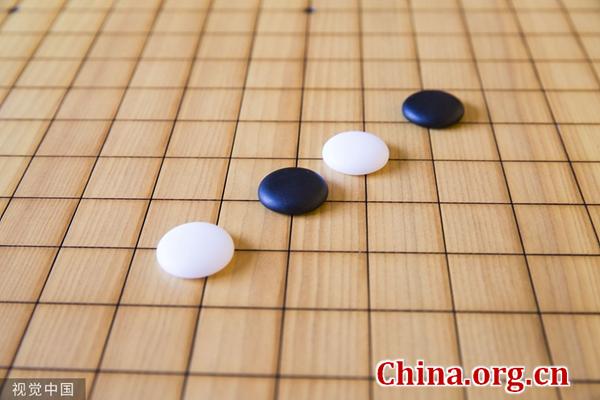《红楼梦》英译品读 (十八)
作者:王晓辉
围棋,古称“弈”,也叫“手谈”,是世界上最古老的棋盘游戏。传说上古时尧帝为了启发教育儿子丹朱而创制了围棋,先秦典籍中有“尧造围棋,丹朱善之”的记载。如果传说是真的,那么围棋至少应该有5000年以上的历史了。围棋和古琴、书法、绘画一样,是中国古代读书人文化修养的体现,与琴、书、画相比,围棋还具有独特的趣味性和竞争性,所以,很受士大夫阶层的青睐,在大家族中也很流行。

贾府里的四位小姐,元春、迎春、探春、惜春,身边各有一个丫鬟,名字都很文艺,抱琴、司棋、侍书、入画,分别对应琴棋书画四艺。迎春虽然给丫鬟取名司棋,但她好像不怎么喜欢下棋,倒是惜春对围棋很着迷。着迷并不等于是高手,那么,《红楼梦》中真正的高手是谁呢?答案是:妙玉。
小说中有多处提到下棋,往往只是一带而过,只有对惜春和妙玉两人对弈的描写,着墨颇多。《红楼梦》第87回,贾宝玉去看惜春,刚到窗下,只听屋里微微一响,不知何声。宝玉站住再听,半日,又“拍”的一响。宝玉还未听出,只见一个人道:“你在这里下了一个子儿,那里你不应么?”宝玉方知是下棋呢。但只急切听不出这个人的语音是谁。底下方听见惜春道:“怕什么?你这么一吃我,我这么一应;你又这么吃,我又这么应:还缓着一着儿呢,终久连得上。”那一个又道:“我要这么一吃呢?”惜春道:“啊嗄,还有一着反扑在里头呢,我倒没防备。”宝玉听了听那一个声音很熟,却不是他们姊妹,料着惜春屋里也没外人,轻轻的掀帘进去。看时不是别人,却是那栊翠庵的槛外人妙玉。这宝玉见是妙玉,不敢惊动。妙玉和惜春正在凝思之际,也没理会。宝玉却站在旁边,看他两个的手段。只见妙玉低着头,问惜春道:“你这个畸角儿不要了么?”惜春道:“怎么不要?你那里头都是死子儿,我怕什么?”妙玉道:“且别说满话,试试看。”惜春道:“我便打了起来,看你怎么着。”妙玉却微微笑着,把边上子一接,却搭转一吃,把惜春的一个角儿都打起来了,笑着说道:“这叫做‘倒脱靴势’。”
这一段描写中涉及到几个围棋的术语:吃、应、连、扑、打、接、倒脱靴,不会下棋的人看不太懂,外国读者更会摸不着头脑。
闵福德(John Minford)的译文:
He stood still and listened again, in the hope of hearing it more clearly. There it was! A distinct tap! He was still trying to think what it could be, when a voice said:
'Why have you made that move, and not countered there?'
It was a game of Go! But Bao-yu did not have time to recognize the voice of the speaker. He heard Xi-chun reply:
'Why should I bother? If you take me there, I simply counter here, and if you take me again. I shall still be one move ahead, and in the end I shall be able to connect.'
'And what if I take you here?'
'Aiyo!' exclaimed Xi-chun. 'You had an inside counter-attack up your sleeve. I'm defenceless.'
...
Bao-yu continued to stand there and watch. Adamantina leant over the board and said to Xi-chun:
'Do you want to lose that whole corner?'
'Of course not! It's perfectly safe. All those pieces of yours are "dead", aren't they?'
'Are you sure? Go ahead and try.'
'All right. There's my move. Now let's see what you can do.'
A smile crossed Adamantina's face. She placed her next piece to link up with one she already had on the edge of the board, and then pounced on one of Xi-chun's pieces and annihilated her entire corner. She laughed:
'That is called "Pulling Your Boots Off Upside Down"!'
这一段翻译,除了“扑”和“倒脱靴”,外国读者是很容易看懂的:吃=take,应=counter,连=connect,扑=inside counter-attack,打(叫吃)=pounce on,接=link,倒脱靴=pull your boots off upside down。“扑”又称“倒扑”,是对局中常用的吃子手段,先将一子扑入对方口中,迫使对方吃子而导致“气”少,然后再反吃对方,是典型的置之死地而后生。闵福德将“扑”译为inside counter-attack,意思是从对手的势力范围内部进行反击,十分贴切。“倒脱靴”也是围棋死活问题中的一个独特棋形,是在对方吃掉自己数子之后,反吃对方,只不过比“扑”要复杂,业余棋手往往看不出已经出现的“倒脱靴”的棋形,错失良机。“倒脱靴”一般有“方四”和“曲四”两种棋形,“曲四”的情况较多。大概是因为“曲四”形状类似靴子,一旦提子形成“曲四”,就有可能被对手倒提回去,所以才有“倒脱靴”这个形象的称谓。闵福德的译法是pull your boots off upside down,保留了原文的趣味性。

妙玉走了之后,惜春还自己研究了一番棋谱:
“(惜春)静坐了一回,又翻开那棋谱来,把孔融、王积薪等所著看了几篇。内中‘茂叶包蟹势’、‘黄莺搏兔势’,都不出奇;‘三十六局杀角势’,一时也难会难记;独看到‘十龙走马’,觉得甚有意思。”
闵福德英译:
She told a maid to light some incense, and meditated for a while. Then she took down to her Go handbook and began looking through it, studying the tactics of such famous Go Masters of old as Kong Rong and Wang Ji-xin. There was 'Crab Wrapped in Lotus Leaves', and 'Golden Oriole Strikes Hare'; but she found neither of these impressive, and 'Corner Kill in Thirty Six Moves' she found too hard to understand and harder to remember. It was 'Dragon-chain of Ten Galloping Horses' that really caught her fancy.
孔融是东汉末年人,著名的“建安七子”之一,后被曹操所杀;王积薪是唐朝人,玄宗时的翰林院棋待诏,属于挂靠在翰林院专门负责陪皇帝下棋的官员。两人都有围棋专著,但可惜未能传世,只留下一些零散的招法。围棋招法变化多端,棋谱往往会给这些招式起一些生动形象的名字。外国读者读的是小说,不是棋谱,所以,把名字译得生动有趣就可以了,不必过于纠结。
无论惜春怎么打谱,仍然不是妙玉的对手,而且差距还不是一点半点。第111回,又是二人对弈:
“惜春亲自烹茶。两人言语投机,说了半天。那时天有初更时候,彩屏放下棋枰,两人对弈。惜春连输两盘,妙玉又让了四个子儿,惜春方赢了半子。不觉已到四更,正是天空地阔,万籁无声。”
这是一段非常有意境的描写,夜深人静,纹枰对坐,万籁俱寂,只有棋子落在棋盘上发出清脆的响声。
闵福德译文:
Xi-chun made the tea, and the two of them were soon carried away in a spirited conversation that lasted until eight o'clock in the evening, when Landscape laid out the Go-board, and they settled down to play. Xi-chun lost the first two games, but then Adamantina gave her a handicap of four and she managed to win the next by half a point.
Before she knew, it was two o'clock in the morning. Outside, the night was breathlessly still.
让子棋是对弈双方棋力相差悬殊的情况下采取的对局方式,高手让下手执黑,并在棋盘上先放上约定棋子,如果是让四子,就是让黑棋先在四个星位上摆上黑子,然后白棋先行。妙玉能让惜春四子,说明她的棋力高出惜春甚多。“让子棋”英文是handicap game,放在其它体育比赛中叫“让步赛”,牛津字典的解释是a race or competition in which the most skillful must run further, carry extra weight, etc. in order to give all those taking part an equal chance of winning。所以,闵福德将“让了四个子”译为gave her a handicap of four (pieces),十分妥帖。
围棋历史悠久,文化底蕴深厚,隋唐时期传入日本和朝鲜半岛,开枝散叶,形成了众多的流派、定式和招法,因此,有关围棋的术语也就格外复杂,有些还釆用了日语的表达方式。飞(knight's move)、顶(bump)、曲(bend)、尖(diagonal)、托(attach underneath)、冲(push through)、压(push down)、碰(attach to the side)、镇(capping)、挖(wedge)、断(cut)、拆(extension)、搭(attach)、渡(bridge underneath)等,基本上每走一步都有一个说法,至于中国流、大雪崩、相思断、村正妖刀、乌龟不出头等定式和招法,就更不是一两句话能说清楚的了。
闵福德是英国人,不会下围棋,但他是一位严肃的译者,不放过任何细节,虚心向京都大学松平千秋(Matsudaira Chiaki)教授和京都立命馆大学筧文生(Kakei Fumio)教授请教,将惜春和妙玉对弈的描写翻译得活灵活现。这种一丝不苟的态度,着实令人钦佩。
 0
0 






94f3a914-d7e6-4699-92f0-f6f58ab925f5_watermark.jpg)
Go to Forum >>0 Comment(s)